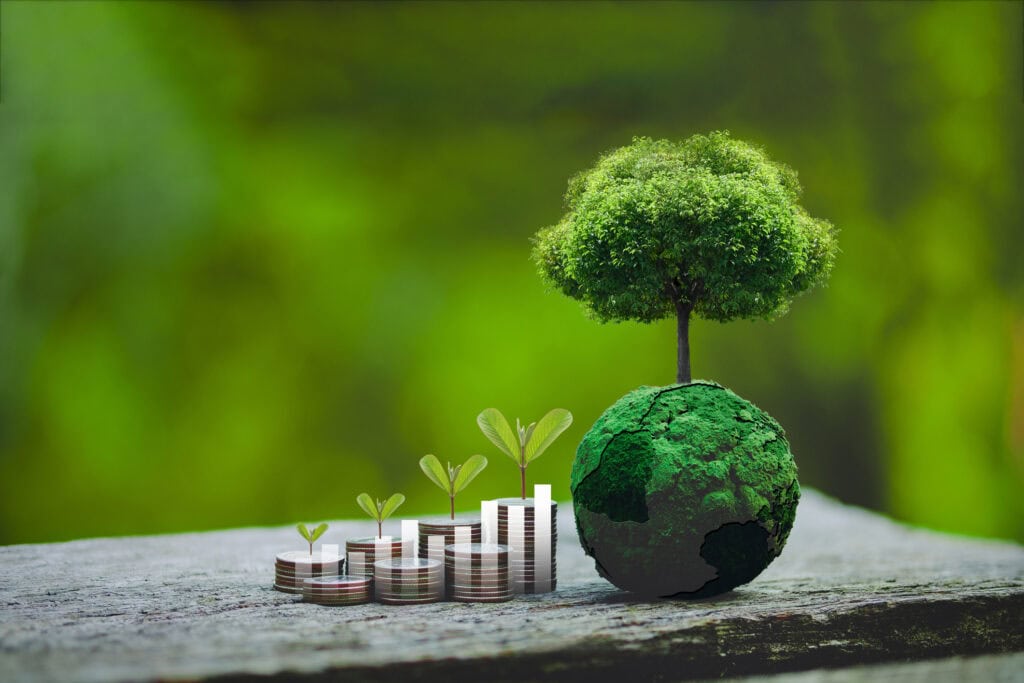倫理的な製造業者:企業の成功と社会貢献のバランスをとる方法

ますます良心的な世界において、製造業者は事業運営において企業の社会的責任(CSR)を最優先にするよう、大きなプレッシャーにさらされています。政府や顧客が製造業者に対し、CSRや環境・社会・ガバナンス(ESG)への取り組みを積極的に取り入れるよう圧力をかけ続ける中で、この要請はますます高まっています。国連グローバル・インパクト(ビジネス&ヒューマン・ライツ・ナビゲーター)によると、環境保護に関する明確な社会政策を持たない企業は、評判やブランド、財務、法務、事業運営など、あらゆる面でリスクが高まる可能性があります。フォーブス誌によると、製造業者はCSRに取り組むことで、従業員や周辺地域の人々の生活にプラスの影響を与えるという真摯なコミットメントを示しています。マッキンゼー・アンド・カンパニーの調査では、消費者の約60%が[…]
サプライチェーンにおける社会的持続可能性を推進するトップ5の技術ソリューション

サプライチェーンにおける社会的持続可能性の向上は、製造業者にとって複雑な課題です。倫理的なサプライチェーンのあらゆる段階において、社会福祉への配慮、持続可能な労働慣行の確保、地域社会への関与、そして人権擁護に尽力する必要があります。このアプローチは困難ではありますが、倫理基準の維持、業務効率の向上、リスクの最小化、そして優秀な人材、消費者、投資家の獲得に不可欠です。サプライチェーンにおける社会的責任を優先することで、製造業者は徹底したベンダー審査と揺るぎないコミットメントを約束しなければなりません。環境、社会、ガバナンス(ESG)における卓越性への道のりは、今日のビジネス環境において困難でありながらも極めて重要な取り組みとなります。マッキンゼー・アンド・カンパニーは最近の記事で、「[…]
グリーン製造業が社会貢献なしに成功できない理由

ESG(環境・社会・ガバナンス)の義務化を背景に、ネットゼロ・コミットメントに沿ったグリーン製造業への世界的なシフトが加速しています。例えば、欧州連合(EU)のネットゼロ産業法(NZIA)は、グリーンエネルギー機器を地元で生産するために、労働者やステークホルダーとの社会的な関与を義務付けています。これは、米国のインフレ抑制法で認められた1兆5兆3,690億米ドルのグリーン補助金への対応策です。米国の新たな法律では、様々なグリーンエネルギー機器の生産に1兆5兆400億米ドルが充当されていますが、炭鉱や発電所の閉鎖の影響を受けた地域社会への支援にも特に重点が置かれています。どちらの事例も、ESG精神における社会的側面の重要性を強調しています。[…]
風評リスク:倫理的な製造がESGの進歩に不可欠な理由

ビジネス目標と持続可能な目標に整合した、堅牢で効果的な環境・社会・ガバナンス(ESG)フレームワークを構築することは容易ではありません。これは非常に微妙な問題であり、すべての製造業者が綿密に取り組む必要があります。環境負荷と労働者への社会的影響をより適切に管理するよう求める社会からの圧力が強まっているため、製造業は業界として、事業運営とデジタルサプライチェーンにESG原則を緊急に統合する責務を負っています。ガートナーの報告によると、世界的に製造業は世界の排出量の約50%を占め、運輸部門と合わせると最大の排出量の一つとなっています。しかし、製造業には排出量以外にも様々な落とし穴があります[…]
スマート製造時代のデータ保護

スマート製造とインテリジェント工場の構築の時代は、製造業のあり方を変革しつつあります。インダストリー4.0の進展により、人工知能(AI)、機械学習(ML)、モノのインターネット(IoT)を活用した強力なツールが急速に導入され、最適化と自動化が加速する一方で、膨大な量のデータも生み出されています。ガートナーは、この新たなレベルのデータ管理に対応するため、2025年までに製造業の40%以上が、デジタルビジネス目標の達成とデータ変革の推進を支援するために、最新のデータ品質(DQ)ソリューションを導入すると予測しています。しかしながら、データの流入に伴い、製造業はリスクを確実に軽減する必要があります[…]
環境の持続可能性を推進するために、グリーンファイナンスは製造業においてどのような役割を果たすのでしょうか?

近年、環境の持続可能性への注目はかつてないほど高まっています。世界が気候変動の転換点をいかに危険なほど間近に控えているかという報告が増えるにつれ、企業や産業界は気候変動や深刻化する環境問題への対応をさらに強化する必要があります。製造業は世界最大の炭素排出源の一つであり、世界全体で20%(トン)の炭素を排出し、世界のエネルギーの54%(トン)を消費しているため、環境の持続可能性は製造業にとって極めて重要な課題となっています。このセクターが成長と進化を続けるにつれ、環境への影響を最小限に抑える必要性がますます高まっています。これは[…]
スマート製造が持続可能性と公平性を推進する方法

過去数世紀にわたり、世界は驚異的なスピードで発展してきたと言っても過言ではありません。私たちは歴史を通して、幾度となく変革的な飛躍を遂げてきました。そして、その変化のスピードは時とともに加速する一方です。この変革には、製造業の進化も含まれています。第一次産業革命における蒸気と機械の使用から、今日広く見られるインダストリー4.0で広く利用されているスマート製造ソリューションとテクノロジーへの発展です。インダストリー4.0としても知られるスマート製造とは、高度な製造技術、データ分析、人工知能、機械学習、そしてモノのインターネット(IoT)を[…]
ESGのための資本配分の最適化:製造業者にとっての主要戦略

喫緊の気候変動問題により、環境・社会・ガバナンス(ESG)要素への注目は、今日、強調しすぎることはありません。消費者の関心も高まり、企業に対し、ESGを事業目標や業務目標と整合させるよう、明確な立場を示すよう圧力が高まっています。多くの企業がこの要請に応えており、ESG重視の機関投資家による投資は、2021年の1兆5千億米ドル(18.4兆米ドル)から2026年には8兆4千億米ドル(1兆5千億米ドル)増加し、33.9兆米ドルに達すると予想されています。製造業では、長期的な持続可能な成長を促進する上で、ESG要素の重要性を企業がますます認識しつつあります。こうした重要な成長ドライバーの一つは戦略的な資本配分ですが、多くの製造業のリーダー企業は依然として十分な取り組みを行っていません。EYの調査によると、世界のCFO500人のうち721兆4千億米ドル([…])が、ESGへの取り組みを積極的に行っていないことが明らかになりました。
長距離貨物輸送が鉱業サプライチェーンの持続可能性に与える影響を理解する

前回オンラインで買い物をしたときのことを思い出してみてください。商品はどこから発送されましたか?どこで製造されましたか?そして、その商品の製造に必要な原材料はどうでしたか?商品が最終的にお客様のお手元に届くまでには、サプライチェーンの複数の段階を経て、様々な場所を輸送された可能性が高いでしょう。長距離輸送は、製造業者とサプライヤー、販売業者、そして最終的には顧客を結び付け、広大な距離にわたる商品の円滑な流れを確保する上で重要な役割を果たしています。しかしながら、長距離輸送の頻繁な利用は、環境および社会にとって重大な課題をもたらし、温室効果ガス(GHG)排出量の増加を招き、気候変動と環境悪化の一因となっています。[…]
2024年の展望:注目すべき製造業の5つのトレンド

2023年、製造業は地政学的不安定性、人材不足、サプライチェーンの混乱など、様々な大きな課題に直面し、業界全体の混乱をさらに悪化させました。しかし、これらの困難にもかかわらず、製造業はデジタル化と持続可能な発展へのコミットメントを維持しており、私たちも業界がこれらの重要な目標を達成できるよう支援することに尽力しています。過去12ヶ月間、私たちは、製造現場のインテリジェンスの向上、循環型経済の創出、フェアトレード製造の重要性、デジタルサプライチェーンの台頭、マイクロファクトリーの可能性、AIとハイパーオートメーション、サイバーレジリエンスの強化、ハイパーパーソナライゼーションが製造業を変える理由、そしてジェネレーティブAIとインダストリアルメタバースなど、業界全体にとって重要なトピックをいくつか取り上げました。私たちは、重要な[…]
願望から行動へ:メーカーが持続可能な実践を評価するための枠組み

製造業向けに設計された、先駆的なサステナビリティ成熟度指標「COSIRI」をご紹介します。COSIRIは、ボトムアップの洞察をより効果的に活用し、既存の企業戦略や排出削減目標に沿って持続可能な変革を拡大するための支援を提供します。サステナビリティがもはや選択ではなく必須となった世界において、COSIRIは企業をより環境に優しく責任ある未来へと導く貴重な羅針盤となります。産業界は温室効果ガスの実質ゼロ排出を目指していますが、大規模な成果はまだ達成されていません。しかしながら、ステークホルダーや株主からの期待は、あらゆる業種の企業にその進展を加速させるプレッシャーを与えています。産業界は、サステナビリティへの道筋には[…]が含まれることを認識しています。
デジタルツインが製造業メタバースの構成要素である理由

インダストリー4.0は近年、製造業全体に大きな変化をもたらしました。デジタルトランスフォーメーションへの注力と、最新のデジタル機能の導入により、製造業者は生産性、効率性、持続可能性の向上を実現しています。これらの新しいツールを支えるのは、人工知能(AI)やビッグデータといったスマートテクノロジーです。その中でも重要なツールの一つがデジタルツインです。この仮想シミュレーションソリューションにより、製造業者は「メタバース」内に自社の工場やシステムの仮想レプリカを作成し、その仮想世界のデータを活用して業務の効率化、効果的な研究の実施、プロセスの改善を図ることができます。しかし、デジタルツインとは何でしょうか?そして、デジタルツインは製造業の基盤となるものと言えるのでしょうか?[…]
相互接続が進む製造業におけるサイバーレジリエンスの構築

自動化、スマートロボット、そしてビッグデータは、今日の製造業において広く普及しています。従来の大規模工場から、より小規模で機敏なマイクロファクトリーまで、多くの現代の生産プロセスは、ビッグデータや産業用IoT(IIoT)などを基盤としたインダストリー4.0テクノロジーに依存しています。IIoTによる相互接続性の向上は、効率性の向上やミスの削減、よりスマートな予測、コスト削減など、製造業に様々なメリットをもたらしています。しかし、これらのメリットには新たな課題とリスクも伴います。サイバー攻撃が製造業にもたらす潜在的な混乱は甚大です。機械のダウンタイムやプロセス停止といった運用リスクは、特に[…]
デジタル時代に成功するための戦略:リーンやシックスシグマなどの本質的な方法論を理解する;トルコにおけるスマート産業準備指数

業務効率化への道筋は、ますますデジタル化へと向かっています。組織が変革の道を進むにつれて、リーン原則とデジタルトランスフォーメーションが融合し、絡み合うようになるという有力な予測があります。8月にSOCAR Turkiyeが主催した「Lean Six Sigma Day」カンファレンスにおいて、INCITはパネルスピーカーとして「デジタルトランスフォーメーションとリーン:ビジネスプロセスの効率性向上」セッションで様々なトピックを掘り下げました。このイベントには、継続的改善の専門家、学生、そしてビジネス分野の学者など、多様なコミュニティが参加し、経験や洞察を交換し、将来を見据えたビジネス戦略について活発な議論を行う貴重な機会となりました。= ムーアの法則、メトカーフの法則、ワトソンの法則 […]
AIとハイパーオートメーションが持続可能な製造業を推進する方法

自動化はビジネスを永遠に変えました。プロセスの合理化と新たな運用効率の創出により、製造業は他の多くの業界と同様に、自動化を業務の中核として取り入れてきました。自動化が前例のない変化を引き起こしたことは否定できませんが、ハイパーオートメーションは変革を全く新しいレベルへと引き上げます。近年の人工知能(AI)と機械学習の劇的な発展は、製造業におけるハイパーオートメーションの成長を促し、ハイパーオートメーション市場は2028年までに1兆5,822億米ドルに達すると予測されています。Salesforceの調査によると、5社中4社が2024年までにハイパーオートメーションを技術ロードマップに組み込む予定であることが分かりました。高度な自動化ツールは効果的にプロセス効率を高めますが、[…]
アゼルバイジャンのスマート産業準備指数:INCITがIMTIと共同でスマート産業準備指数の研修・試験センターを設立

スマートインダストリーレディネスインデックス(SIRI)がアゼルバイジャンに登場!今年7月、イノベーションマネジメント・TRIZ研究所(IMTI)と共同で、同国にスマートインダストリーレディネスインデックスのトレーニング・試験センターを設立するという共通のコミットメントを締結しました。これにより、アゼルバイジャンの製造業者、業界関係者、リーダー、コンサルタントなど、多くの方が、スマートインダストリーレディネスインデックスの認定変革コンサルタントになるためのアクセスが容易になります。スマートインダストリーレディネスインデックス認定を取得するには、まずスマートインダストリーレディネスインデックスのトレーニング・試験コースを受講する必要があります。トレーニングカリキュラムは40時間以上の教室でのトレーニングで構成され、製造業、インダストリー4.0、スマートインダストリーレディネスインデックスのフレームワークなどに関する内容を網羅しています。[…]
メーカーが持続可能な倉庫を実現するための3つの方法

長年にわたる気温上昇と猛暑は、地球温暖化と気候変動の深刻な影響を露呈させ、より持続可能な未来のために環境保護への取り組みの重要性を浮き彫りにしています。メーカーは責任ある行動を取り、可能な限り持続可能な対策に重点的に環境保護活動に取り組まなければなりません。メーカーが容易に達成できる対策の一つは、持続可能な倉庫の構築です。倉庫の二酸化炭素排出量は、他の施設と比較して1平方メートルあたり33kWh/m2と低いものの、その規模の大きさゆえに依然として驚くほど高い水準にあります。そのため、メーカーは効率的で持続可能な倉庫システムへの移行を進めることが重要です。このようなシステムを構築するには、綿密な計画と思慮深い[…]
INCITはスイス・スマート・ファクトリーと提携し、「スマート・サステナブル・マニュファクチャリング・トランスフォーメーション・センター」を設立

国際産業変革センター(INCIT)は、スイス・スマート・ファクトリーと提携し、「スマート・サステナブル・マニュファクチャリング・トランスフォーメーション・センター(SSMTC)」と名付けられたカスタマイズされた製造施設を設立しました。この革新的なコラボレーションは、インダストリー4.0とスマートマニュファクチャリングの原理を推進する上で大きな一歩となります。このコラボレーションの意義は何でしょうか? 1. 包括的な専門知識 このコラボレーションは、スマートマニュファクチャリング分野における2つの有力な組織の専門知識を融合させます。スイス・スマート・ファクトリーは先進的な製造技術に関する知識と経験を提供し、INCITは産業変革戦略と世界的なトレンドに関する洞察を提供します。 2. データに基づく洞察 スマートインダストリー準備指数(SIRI)とXIRI-Analyticsの統合により、[…]
次世代製造工場のエンドツーエンドのデジタル変革を監督するための6つのステップ

世界中の製造施設の能力は飛躍的に向上し、組織は業務効率の向上、ステークホルダーとのリアルタイムな連携、部門間の連携強化を実現しています。そのため、イノベーションの限界を押し広げるため、自社の製造工場や施設にエンドツーエンドのデジタルアプローチを導入しようとする組織リーダーが増えています。しかし、熾烈な競争、環境意識の高まりを背景にした顧客の増加、そして常に変化する規制環境により、実現可能なデジタルトランスフォーメーションは容易ではありません。多くのデジタルトランスフォーメーション・プロジェクトにつきものの落とし穴を避けたいリーダーにとって、以下の6つのステップが役立ちます。1) 目標を明確にする 目標達成から始める。組織として、何を目標とするのかを理解し、合意することが重要です。[…]
最先端のデータ分析:なぜ新しい技術だけでは未来の工場を活性化できないのか

データは、シンプルな集計マーカーやメモから複雑なスプレッドシートやクラウドストレージまで、何世紀にもわたって様々な形で収集され、プロセスに不可欠な要素となってきました。今日、作成・保存される複雑なデータ、いわゆるビッグデータの量と量は驚異的で、1日あたり推定25億ギガバイトが生成されています。製造業では、人工知能(AI)、機械学習(ML)、モノのインターネット(IoT)デバイスなどの、よりスマートで相互接続された技術が業務システムに統合され、作成・配信されるデータの量が急速に増加しています。しかし、ビッグデータの活用と分析を十分に理解していなければ、データは[…]
INCITがLinkedInニュースレター「Manufacturing Insider」を開始

近年、製造業におけるデジタルトランスフォーメーションは飛躍的に進歩しており、その勢いは衰える気配がありません。絶えず変化する業界環境の中で、パートナーやネットワークの皆様が最新のトレンドや知見を把握できるよう、LinkedInニュースレター「Manufacturing Insider」を配信開始しました。この新しい月刊LinkedInニュースレターでは、洞察力に富んだソートリーダーシップコンテンツを提供し、インダストリー4.0と世界中のデジタルトランスフォーメーションの最新トレンドを掘り起こすことを目指しています。製造業の最新動向を常に把握するには、こちらからLinkedInニュースレターにご登録いただくか、月刊メールニュースレターにご登録ください。
中国におけるスマート産業準備指数:TÜV SÜDが中国で初のCSA研修を実施

INCITは、アクセラレーションパートナーであるTÜV SÜDが中国蘇州で初の認定スマート産業準備指数アセッサー(CSA)研修を実施したことを誇りに思います。この研修は、2023年6月13日に蘇州工業園区ボッシュインテリジェント製造支援センターにCSA研修・試験センターが正式に開設された後に実施されました。CSA研修では、インダストリー4.0、スマート産業準備指数のフレームワークとツール、ビジネスコンサルティングのコンセプト、そして公式スマート産業準備指数評価手法に焦点を当てています。これは、中国の製造業をより技術集約型の大国へと向上させるという産業政策への貢献というINCITとTÜV SÜDの歩みにおける大きな節目であり、[…]
フェアトレード製造とは何か、そしてそれが地球規模の持続可能性にとってなぜ重要なのか?

フェアトレード製造運動は、持続可能な生活を促進する厳格な基準を推進しています。安全な労働条件、環境保護、そしてより強固で透明性の高いサプライチェーンの構築を提唱しています。この運動は、搾取労働などの搾取的慣行の犠牲者となった可能性のある発展途上国の労働者にとって特に重要です。2013年にバングラデシュで発生したラナプラザ崩壊事故など、他の事件も、多くの国の労働者が直面している危険な労働条件を浮き彫りにしています。人的被害に加え、環境保護もフェアトレード製造に深く根付いています。気候変動が悪化する中、製造業者はフェアトレード製造を導入し、自らの役割を果たす必要があります。[…]
カーボンニュートラルな職場を構築する方法

カーボンフットプリントの削減に関して、多くの製造業者は生産プロセスとサプライチェーンのエネルギー効率の向上を優先する傾向があります。しかし、職場における日常的な二酸化炭素排出量への取り組みも同様に重要です。日常のオフィス業務に小さな変化を加えることで、温室効果ガス排出量の削減、環境・社会・ガバナンス(ESG)指標の向上、そして優秀な人材の確保に大きく貢献することができます。従業員の3分の2以上が、環境の持続可能性を推進する組織への応募や採用に意欲的であると回答しており、39%は雇用主が今後数年以内に排出量をネットゼロに削減することを期待しています。しかし、より効果的な対策を講じて、より持続可能な環境を確立するには、 […]
エコパッケージが製造業にどう影響を及ぼしているか

比較的広い意味での「エコパッケージ」とは、原材料から生産、廃棄に至るまで、ライフサイクル全体を通して材料とエネルギーを最適化するように物理的に設計されたパッケージを指します。サステナブル・パッケージング・アライアンス(Sustainable Packaging Coalition)によると、エコパッケージとは次のような特徴を備えています。ライフサイクル全体を通して使用しても有益で、安全かつ健康的であること。性能とコストの両面で市場基準を満たしていること。再生可能エネルギーを用いて調達、製造、輸送、リサイクルされていること。再生可能またはリサイクルされた原材料の使用が最適化されていること。クリーンな生産技術とベストプラクティスを使用していること。材料とエネルギーを最適化するように物理的に設計されていること。生物学的または産業的閉ループサイクルで効果的に回収・利用されていること。パッケージにおける持続可能性への取り組み。製造業者にとって、環境基準を満たすことは[…]
製造業における水効率の向上の必要性とその方法

水は歴史を通じて社会の成長と発展に極めて重要な役割を果たしてきました。様々な産業や公共用水として、相当量の水が消費されています。製造業も例外ではなく、米国だけでも1日あたり182億ガロン(680億リットル)以上の水が工業用途で使用されています。効率的な製造プロセスは資源の枯渇に直接影響するため、製造業では節水が不可欠です。また、効果的な水の使用はコストと廃棄物の削減を通じて業務効率を高めることができます。製造業における節水と環境への影響 製造業において、節水は環境と業務の両方に劇的な影響を与えます。米国国勢調査局の報告書によると、世界の66%以上の製造業が節水に取り組んでいます。
マレーシアの新たなパートナー:セランゴール人材開発センター

国際産業変革センター(INCIT)は、2023年4月1日より、セランゴール人材開発センター(SHRDC)と連携し、持続可能性と人材育成に取り組むことで製造業の変革へのコミットメントをさらに強化します。INCITは、世界の製造業の発展、発展、成長を支援するために、産業変革を促進することを目指しています。この目標達成のため、スマートインダストリー準備指数(SIRI)と消費者サステナビリティインダストリー準備指数(COSIRI)を用いて、デジタルトランスフォーメーションの進捗状況を評価し、世界の各産業の持続可能性と環境・社会・ガバナンス(ESG)への取り組みの透明性をそれぞれ測定しています。SHRDCは、製造業の持続可能性向上に特化したセンターです。[…]
INCITはSITのイェ・フック・チョン准教授をグローバルネットワーク初のアカデミアフェローに任命しました。

2023年3月22日(水)、シンガポール。国際産業変革センター(INCIT)は、シンガポール工科大学(SIT)のイー・フック・チョン准教授をINCITアカデミアフェローに任命しました。イ准教授は、この資格でINCITのパートナーおよび協力者ネットワークに加わる初の人物となります。高度な資格と経験を持つ製造業の専門家であるイ准教授は、SITのエンジニアリングクラスターに所属しています。彼は、スマートインダストリーレディネスインデックス(SIRI)認定アセッサーであり、航空宇宙製造や防衛産業など、30年以上にわたりこの分野で活躍してきました。2013年にSITに着任し、自身のスキルと知識を伝え、SITの[…]
製造業者のネットゼロへの道のりを加速させるグローバル持続可能性優先順位付け指数

2023年2月27日(月)、シンガポール。先日ダボスで開催された世界経済フォーラム2023年年次総会において、国際産業変革センター(INCIT)は消費者サステナビリティ・インダストリー・レディネス・インデックス(COSIRI)を発表しました。COSIRIは、この種のものとしては初となる、独立したメーカー中心のフレームワークであり、世界の業界プレーヤーのサステナビリティ成熟度、ESGの透明性と報告をベンチマークすることを目指しています。世界経済フォーラム、INCIT、そしてビジネスおよびテクノロジー変革企業であるキャップジェミニは、COSIRIの規模拡大と加速に向けて協力します。COSIRIは、COSIRIシステムが提案する次のステップに基づき、メーカーが持続可能な変革に関するより情報に基づいた意思決定を行えるよう支援します。さらに、COSIRIフレームワークには、持続可能性の星評価システムが含まれており、[…]
電子機器製造におけるエネルギー効率とイノベーションの影響

産業用電子機器から個人用モバイル機器に至るまで、エレクトロニクス産業は社会の仕組みに大きな影響を与えてきました。そして、それは今日も続いています。しかしながら、エレクトロニクス産業の成長は深刻な環境問題を引き起こしており、世界全体で4%(トン)の温室効果ガス(GHG)が排出されています。2030年までに世界の電力需要は30%(トン)増加すると予想されており、エレクトロニクス産業が持続可能性を高めるためには、エネルギー効率を向上させることが不可欠です。イノベーションと新しいプロセスは、効率性の向上と排出量の削減に役立ちます。近年、人工知能(AI)などのより電力を消費する新しい技術が広く普及しています。これが、世界のエレクトロニクス産業の成長を牽引しています。[…]
INCIT、EMEA地域の上級役員の任命を発表

グローバルシンクタンクINCITは、事業の国際展開拡大に伴い、新たな上級幹部の任命を発表しました。アイクト・イェニ氏が事業開発ディレクターに任命され、EMEA(ヨーロッパ、中東、アフリカ)地域を担当し、INCITのパートナーおよびデータ分析メンバーシップの開発を担います。INCITはこの地域におけるプレゼンスを急速に拡大しており、今回の人事により、既存および新規のお客様に対し、それぞれのタイムゾーン内でより的確なサービス提供が可能になります。アイクト氏は製造業のシニアエキスパートであり、国際的な舞台で様々なビジネスに15年以上携わってきました。彼は高度な製造エンジニア兼コンサルタントであり、リーン・シックス・シグマ[…]
世界経済フォーラム年次総会2023に世界のリーダーが集結

2023年1月16日から20日まで、世界のリーダーたちがスイスのダボスで開催された世界経済フォーラム(WEF)年次総会2023に集い、「分断された世界における協力」というテーマについて議論しました。WEF年次総会53回目となるこのイベントでは、対話と官民協力の価値と重要性が再確認されました。リーダーたちはまた、世界がCOVID-19パンデミックの余波から脱却する中で、社会経済的・地政学的課題や危機にどう対処していくかについても議論しました。前例のない状況下で、政府、企業、そして地域社会のリーダーたちが、どのように変化を推進し、今日そして未来の課題を解決しようとしているのかをご覧ください。[…]
IT/OTの融合:2023年の課題と機会

製造業がインダストリー4.0を導入し、さらなるデジタル化を進める中で、注目されている分野の一つが、情報技術(IT)と運用技術(OT)の融合、すなわちIT/OT融合です。従来、ITシステムとOTシステムはそれぞれ異なる領域を統括していたため、サイロ化して機能していました。OTは製造システムや産業機器といった物理的な世界に深く関わっています。一方、ITはサーバー、ネットワーク、データといったデジタル領域といったデジタル世界と深く関わっています。そのため、多くの組織ではITシステムとOTシステムは本質的に異なるものとして捉えられてきました。効果的なIT/OT融合を活用してインダストリー4.0のメリットを最大化するには、急速なデジタル化とインダストリー4.0が […]
2022年:年次レビュー
過去1年間、世界情勢を一変させる世界的な出来事、地政学的不安定性、そして経済の不確実性は、常に変化する世界において唯一不変のものでした。産業界や企業が流動的な世界に適応し続ける中、製造業はこれまで以上に力強く成長を遂げており、国際産業変革センター(INCIT)は、この分野における変革の先導役となるよう努めてきました。スマートインダストリー準備指数(SIRI)などのベンチマークツールや、ManuVateのような新しい協働プラットフォームを通じて、製造業が効果的かつ持続可能な変革を実現できるよう支援するという使命を遂行してきました。そして、私たちの取り組みはまだ始まったばかりです。2022年を締めくくるにあたり、私たちは振り返ります[…]
スマートで持続可能な製造 – クリーンテクノロジーと先進的な製造を融合

近年の自動化、機械学習、そして先端技術の台頭は、製造業におけるデジタルトランスフォーメーションを加速させ、よりスマートで効率的な製造プロセスへと導いています。こうした最新技術の進歩を様々なプロセスやシステムに統合することで、製造業は生産性と効率性の向上に成功しましたが、さらに重要なのは、より柔軟性、俊敏性、そして将来への備えを強化できたことです。現在、環境と社会への責任が強く意識される中で、スマート製造業はより環境に優しく、より持続可能な生産活動へと移行しています。2050年までにネットゼロを達成するための時間は刻々と迫っており、環境規制の厳格化、投資家の要求の高まり、顧客の期待の変化など、様々な要因により、持続可能性は最重要課題となっています。[…]
貴社の従業員は、食品・飲料製造におけるさらなる最適化の準備ができていますか?

世界の製造業においてインダストリー4.0が加速する中、見落とされがちな分野が食品・飲料(F&B)製造です。食品・飲料製造は半導体ほど重要視されておらず、電気自動車ほど華やかでもないと認識されていますが、大衆の食糧供給において重要な役割を果たしていることは疑いようがありません。そして、インダストリー4.0は、より回復力があり、効率的で生産性の高い食品・飲料業界の創出に貢献する可能性があります。インダストリー4.0の導入とデジタルトランスフォーメーションは、食品・飲料製造にどのようなメリットをもたらしたのでしょうか?業界は将来に向けてどのように労働力の育成に取り組んできたのでしょうか?そして、労働力の育成を優先しない場合、どのような悪影響が生じるのでしょうか?ケーススタディ:ニュージーランドの食品・飲料業界におけるスキルギャップへの対応 食品・飲料製造[…]